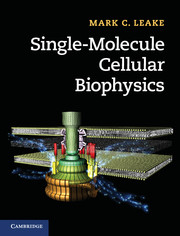Book contents
- Frontmatter
- Contents
- Preface
- 1 Once upon a (length and) time (scale). . .
- 2 The molecules of life – an idiot’s guide
- 3 Making the invisible visible: part 1 – methods that use visible light
- 4 Making the invisible visible: part 2 – without visible light
- 5 Measuring forces and manipulating single molecules
- 6 Single-molecule biophysics: the case studies that piece together the hidden machinery of the cell
- 7 Molecules from beyond the cell
- 8 Into the membrane
- 9 Inside cells
- 10 Single-molecule biophysics beyond single cells and beyond the single molecule
- Index
6 - Single-molecule biophysics: the case studies that piece together the hidden machinery of the cell
Published online by Cambridge University Press: 05 February 2013
- Frontmatter
- Contents
- Preface
- 1 Once upon a (length and) time (scale). . .
- 2 The molecules of life – an idiot’s guide
- 3 Making the invisible visible: part 1 – methods that use visible light
- 4 Making the invisible visible: part 2 – without visible light
- 5 Measuring forces and manipulating single molecules
- 6 Single-molecule biophysics: the case studies that piece together the hidden machinery of the cell
- 7 Molecules from beyond the cell
- 8 Into the membrane
- 9 Inside cells
- 10 Single-molecule biophysics beyond single cells and beyond the single molecule
- Index
Summary
Gallia est omnis divisa in partes tres (All Gaul is divided into three parts)
(Julius Caesar, De Bello Gallico, 51 BC)GENERAL IDEA
Here we introduce the seminal biophysics investigations which have transformed our understanding of biology at the single-molecule level, and lay the foundations for describing single-biomolecule experimentation on functioning live cells
Introduction
An instructive exercise for those learning about single-molecule biophysics is to compile a list of one’s own top ten research papers of all time. The choice is obviously subject to a great deal of personal bias, and is a dynamic structure which may change with time, and some of the early, seminal papers on the list might later be superseded by subsequent incarnations with more of the original unresolved questions resolved (and maybe even with the ‘right’ answers, as opposed to what were perhaps novel but slightly incorrect ‘best guesses’ at the time!). Even so, as a process for understanding how, and why, single-molecule biophysics has evolved the way it has, and how it is likely to progress into the arena of far greater physiological relevance in the near future, the reader might find the exercise suprisingly fulfilling. In this chapter we discuss some of the strong candidates for this list of seminal papers, and lay the foundations for the remaining chapters in this book which describe real single-biomolecule experiments performed either on living cells or in an environment which has substantial physiological relevance.
- Type
- Chapter
- Information
- Single-Molecule Cellular Biophysics , pp. 149 - 158Publisher: Cambridge University PressPrint publication year: 2013



